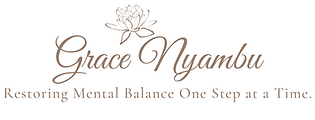Connection: Cultivating Openness Around Suicide
- gracenyambu
- Sep 21, 2024
- 4 min read
As I sat down to write this post, I hit a wall. I wanted to make this piece compelling, to build on my previous post in the series, but I kept circling the same question: How do I make this impactful? I wanted to tell a story, to dive deeper into the conversation, but everything felt too generic. Then it hit me. This topic doesn’t always pull in massive attention. And I get why ... it’s hard. Talking about suicide is hard. But avoiding the conversation doesn’t make it any less important. In fact, it makes it more critical.
According to the World Health Organization (WHO), suicide is one of the leading causes of death for people between 18 and 29 years old. That’s a statistic that should make us pause. It should remind us that this isn’t just something we hear about in passing; it’s a crisis that’s unfolding in front of us. It’s happening to our loved ones, our friends, and sometimes to the person you least expect. But how do we even begin to recognize the signs when talking about it feels so foreign, so difficult?

Before we dive into the signs of suicidal thoughts or ideation, nothing can fully prepare you for this conversation. Whether it's with a friend, a loved one, or even a colleague, realizing that someone you care about might be struggling can be heartbreaking. The truth is, it's tough. It’s tough to imagine that someone you love may be thinking of harming themselves. So, as you read this and gain knowledge about recognizing the signs, remember to take care of yourself, too. This can get heavy.
We often hear that someone who has suicidal thoughts will ask for help, withdraw socially, or show signs of increasing alcohol and drug use. These are often the most recognizable physical signs. But what we don’t always talk about is how well some people hide their pain. Not everyone who is struggling will outwardly show it. Yes, there are people who will ask for help, and that effort to reach out is incredibly important to recognize. Then there are those who feel that reaching out will only burden or cause panic to their loved ones. For them, staying silent seems like the safer option.

So while we may be looking for overt signs, there may be people in our communities that battle with suicidal thoughts yet don't show them. For example, some people may isolate themselves, while others may try to reconnect in an effort to push back against the dark thoughts they’re battling. The signs don’t always fit neatly into a box. And that’s the hardest part ... how do you help someone when you don’t know what’s really going on?
The short answer is that we make it a culture to provide spaces where people can talk freely and openly, without judgment. I know, that’s probably not the detailed analysis you were hoping for, but it’s an answer that we desperately need to hear.
In a world that has become increasingly individualistic and mistrust is common, where is the space for community? Where is the room to call up a friend and say, “I’m struggling, and I don’t know what to do”? Do we even feel like we have that space anymore, where we can be raw and unfiltered and still be heard? I work with people in counseling every day, and one theme I keep seeing is loneliness. It’s not that they don’t have people around them; it’s that they don’t feel they can fully voice their struggles. There’s a sense that being vulnerable is weak, or that asking for help is somehow shameful.

When did we start believing that being strong all the time is the only way to live? When did it become strange to have difficult days? When did it become abnormal to ask for help? And perhaps more importantly, how do we, as a society, view those who seek help? Do we see it as attention-seeking? Or do we recognize that it’s part of the human experience to need a little extra love and support from time to time?
I have yet to meet a person who doesn’t want to feel heard and seen. Not in an attention-grabbing way, but in a genuine, “I’m here for you” way. And that’s what it comes down to ... making sure the people in our lives know they have a place where they can be heard, where they can speak without fear of judgment or rejection. I'll be honest, sometimes, you won’t see the signs. People won’t always tell you what they’re going through. But that doesn’t mean we can’t try. That doesn’t mean we can’t connect more with the people in our lives. We can build deeper relationships, foster stronger communities, and make sure that the people we care about know they aren’t alone. Because at the end of the day, that’s what will make the biggest difference, knowing someone is there even when it’s hard to talk.
In case you are looking for more information about the signs to look out for, click here. In case you are looking for suicide hotlines and emergency numbers, click here.
Feel free to like and share this post as well as leave a comment below (I'd love to hear your thoughts and reflections). In case you or someone you know is struggling at this time, feel free to reach out to me and we can talk more about one on one therapy sessions. That's all from me for now, take care of yourselves and remember to stay intentional!
.png)



Comments